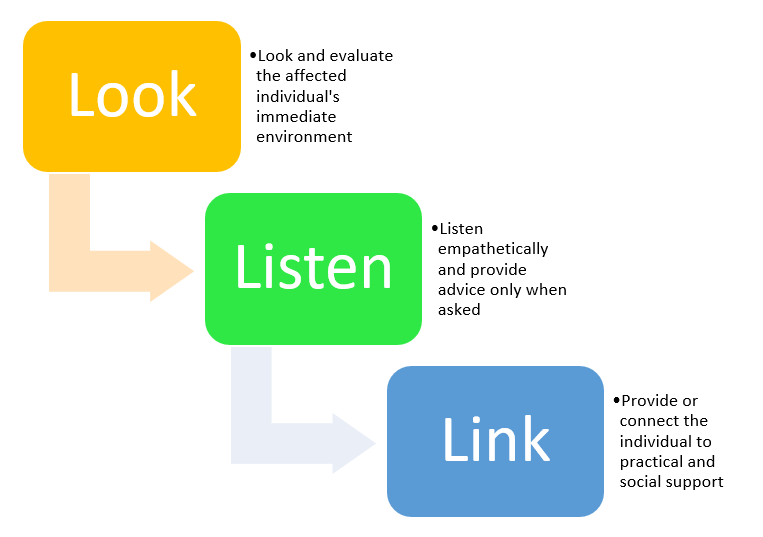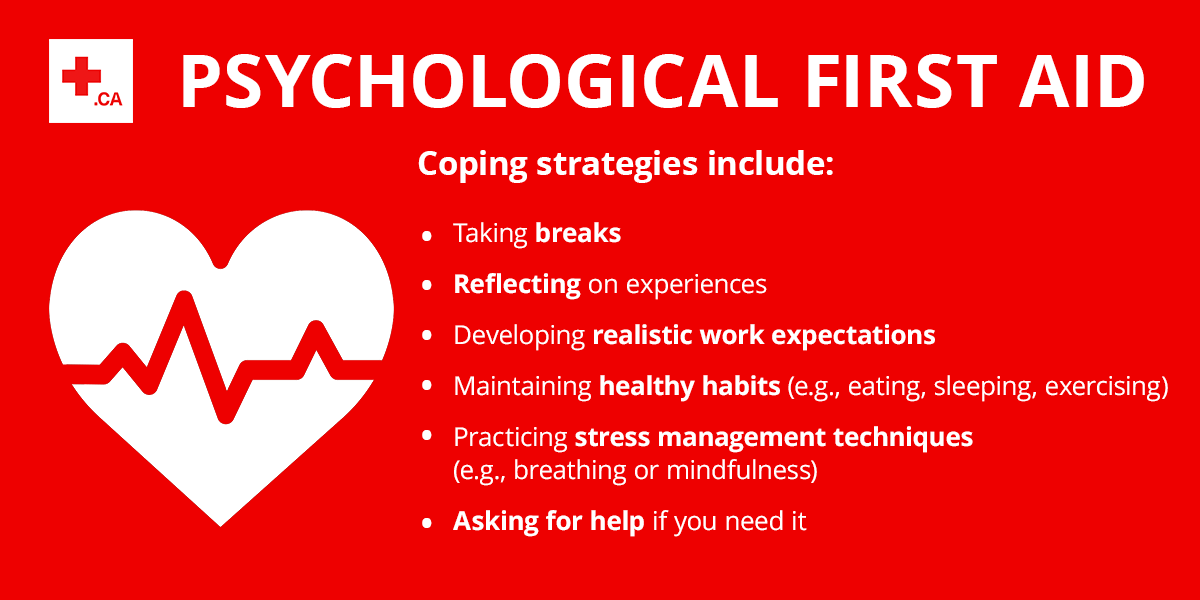Introduction
In times of crisis, psychological distress is as significant as physical injury, necessitating immediate and compassionate support. Psychological First Aid (PFA) is a structured approach to helping individuals cope with distressing events by offering emotional support, ensuring safety, and guiding them toward recovery. Unlike clinical psychological interventions, PFA does not require specialized training but relies on empathy, active listening, and practical assistance. This article provides an in-depth exploration of PFA, its principles, application, and effectiveness in mitigating the adverse psychological impacts of trauma.
Psychological First Aid
Psychological First Aid is an evidence-based intervention designed to reduce acute distress and foster resilience in individuals affected by disasters, accidents, violence, or personal crises. Developed by organizations such as the World Health Organization (WHO), the National Child Traumatic Stress Network (NCTSN), and the National Center for PTSD, PFA has been widely used in disaster response and emergency care settings (Brymer et al., 2006).
Core Principles of PFA
The effectiveness of PFA is anchored in five core principles, identified through research on trauma recovery (Hobfoll et al., 2007)-
- Safety – Ensuring the individual is in a secure and supportive environment.
- Calming – Helping individuals manage acute stress and emotional dysregulation.
- Connectedness – Facilitating social support and access to community resources.
- Self-efficacy – Empowering individuals to regain control over their circumstances.
- Hope – Reinforcing optimism about recovery and the availability of support.

Implementation of Psychological First Aid
PFA is structured around a flexible yet systematic approach that ensures individuals receive the necessary support without causing further distress. This process can be understood through the “Look, Listen, Link” framework recommended by WHO (2011).

1. Look: Assess the Situation
The first step involves observing and evaluating the affected individual’s immediate needs and environment. This includes:
- Determining safety risks and ensuring protection from further harm.
- Identifying individuals who exhibit high levels of distress, such as disorientation, excessive crying, or withdrawal.
- Assessing basic needs, including access to food, water, shelter, and medical care.
2. Listen: Provide Comfort and Emotional Support
Effective communication is essential in PFA. It involves-
- Active Listening- Paying close attention to the individual’s verbal and non-verbal cues.
- Empathy and Validation- Acknowledging their emotions without judgment.
- Avoiding Prescriptive Advice- Refraining from offering solutions unless asked, instead focusing on support and reassurance.
3. Link: Connect with Resources and Support Networks
After establishing rapport and assessing immediate concerns, the next step is connecting individuals to practical resources and social support-
- Providing information about available medical and psychological services.
- Encouraging engagement with family, friends, or community networks.
- Assisting with problem-solving strategies to address immediate challenges.
Read More- Mental Health
Psychological First Aid in Disaster and Crisis Response
PFA has been implemented in various large-scale crises, including natural disasters, armed conflicts, and public health emergencies. Studies indicate that timely PFA interventions can significantly reduce the risk of long-term psychological disorders, such as post-traumatic stress disorder (PTSD) and depression (Shultz & Forbes, 2014).
PFA in Disaster Relief Efforts
Following the 2004 Indian Ocean tsunami, humanitarian organizations provided PFA to affected communities, emphasizing emotional support and resource mobilization. Reports highlighted that individuals who received PFA exhibited lower levels of psychological distress compared to those who did not (Surya et al., 2016).
PFA in the COVID-19 Pandemic
The COVID-19 pandemic underscored the importance of PFA in addressing widespread psychological distress. Healthcare workers and frontline responders utilized PFA to support patients, colleagues, and the general public in coping with fear, grief, and uncertainty (World Health Organization, 2020).
Common Challenges in Psychological First Aid
Despite its effectiveness, PFA practitioners may encounter several challenges-
- Cultural Sensitivity- Different cultural backgrounds influence coping mechanisms, requiring adaptable approaches.
- Limited Resources- Access to mental health services may be constrained in disaster settings.
- Personal Impact on Providers- Those offering PFA may experience secondary trauma or burnout.

Ethical Considerations in Psychological First Aid
PFA providers must adhere to ethical guidelines to ensure the dignity and autonomy of affected individuals. Key ethical principles include:
- Confidentiality- Respecting individuals’ privacy and refraining from sharing sensitive information without consent.
- Non-Coercion- Allowing individuals to decide how they wish to engage with support services.
- Competency- Recognizing one’s limitations and referring individuals to professional services when necessary (Sphere Association, 2018).
Future Directions in Psychological First Aid
The evolving landscape of psychological support necessitates continuous research and innovation in PFA. Future advancements may include:
- Digital PFA Tools: Mobile applications and online platforms for remote psychological support.
- Enhanced Training Programs: Incorporating virtual reality simulations to improve PFA training effectiveness.
- Community-Based Approaches: Strengthening local networks to enhance grassroots PFA delivery.
Conclusion
Psychological First Aid is a vital tool in crisis intervention, enabling individuals to navigate traumatic experiences with immediate support and reassurance. Its foundation in evidence-based principles ensures its effectiveness across diverse settings. By fostering safety, connection, and resilience, PFA plays a crucial role in mitigating the long-term psychological effects of trauma. As societies continue to face global crises, the importance of accessible and effective psychological support remains paramount.
References
Brymer, M., Jacobs, A., Layne, C., Pynoos, R., Ruzek, J., Steinberg, A., & Watson, P. (2006). Psychological First Aid: Field Operations Guide. National Child Traumatic Stress Network and National Center for PTSD.
Hobfoll, S. E., Watson, P., Bell, C. C., et al. (2007). Five essential elements of immediate and mid-term mass trauma intervention: Empirical evidence. Psychiatry, 70(4), 283-315.
Shultz, J. M., & Forbes, D. (2014). Psychological first aid: Rapid proliferation and the search for evidence. Disaster Health, 2(1), 3-12.
Sphere Association. (2018). The Sphere Handbook: Humanitarian Charter and Minimum Standards in Humanitarian Response.
Surya, M., Jaff, D., Stilwell, B., & Schubert, J. (2016). The importance of mental well-being for health professionals during complex emergencies: It is time we take it seriously. Global Health: Science and Practice, 4(1), 7-12.
World Health Organization. (2011). Psychological First Aid: Guide for Field Workers.
World Health Organization. (2020). Mental health and psychosocial considerations during the COVID-19 outbreak. Retrieved from https://www.who.int.
Subscribe to PsychUniverse
Get the latest updates and insights.
Join 3,044 other subscribers!
Niwlikar, B. A. (2025, January 15). 3 Easy Steps to Provide Psychological First Aid. PsychUniverse. https://psychuniverse.com/psychological-first-aid/




